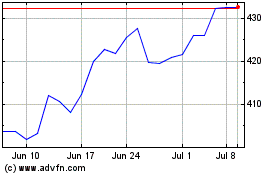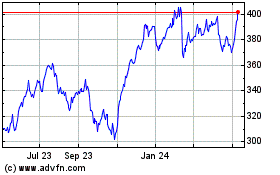Australian Election Losers Could Include Triple-A Rating
July 04 2016 - 7:54AM
Dow Jones News
By James Glynn
SYDNEY -- Australia could lose its rare triple-A credit rating
after a tight general election raised questions about the next
government's ability to curb spending and bring down debt.
The election remains too close to call, but the prospect of a
lengthy period of political instability -- such as a hung
parliament in the 150-seat House of Representatives, where
governments are formed -- complicates Australia's challenge in
revving up an economy hit by the end of a decadelong mining
boom.
On Monday, Standard & Poor's Global Ratings said
"parliamentary gridlock" could trigger a downgrade if it means
Australia's finances don't improve. Moody's Investors Service said
its assessment could change if the new parliament led to an
undesirable shift in policy.
It highlights how politics is increasingly influencing the
thinking of ratings companies as signs grow that the global
economic recovery is faltering. S&P stripped the U.K. of its
pristine triple-A rating within days of the country's vote to leave
the European Union, citing concerns about constitutional and
economic integrity.
Australia has notched up 24 years without a recession -- the
longest current streak in the developed world -- and its problems
are such that other economies might wish for. In 2015 its economy
grew by 3%, with gross government debt estimated at 37%. By
contrast, the eurozone reported growth of 1.5% and Japan of 0.4%,
and the International Monetary Fund put their debt ratios at 93%
and 248%, respectively.
Australia's debt load, however, is growing at a pace that is
among the fastest in the world. After rolling out one of the
biggest fiscal expansions of any major economy in response to the
global financial crisis, the country has failed to bring the budget
back under control as commodity prices have fallen.
Neither the Liberal-National coalition, led by Prime Minister
Malcolm Turnbull, nor the center-left Labor Party, led by Bill
Shorten, made budget repair a central campaign issue -- and ratings
companies fear neither man will be able to push through tough
economic policies to slow the rise in debt if he has to horse-trade
to cobble together a coalition government.
"Irrespective of the political composition of any new
government, we could lower the rating if parliamentary gridlock on
the budget continues and Australia's budgetary performance doesn't
improve broadly as we expected a year ago," said S&P, which is
expected to publish its next official review of the sovereign
rating this month.
Moody's said the credit implications of political uncertainty
would be limited -- if it is short-lived. "The electoral outcome
would affect the sovereign credit profile only if it changed broad
policy priorities and the effectiveness of their implementation,"
said Marie Diron, a senior vice president at the ratings
company.
Investors rely on ratings from S&P, Moody's and Fitch
Ratings when deciding whether to buy bonds. Australia is one of a
handful of AAA sovereigns left, and losing the rating would make it
harder and costlier to attract foreign capital.
To be sure, even lower-rated sovereign debt remains attractive
to investors who consider it a safer bet than global equities or
currencies. Australian government 10-year bond yields hit record
lows last month -- reflecting global trends, but also benign local
inflation.
Paul Dales, chief economist for Australia and New Zealand at
Capital Economics, said a downgrade could be imminent. "A minority
government is unlikely to pass the fiscal measures required to
satisfy the ratings agencies. They may even pull the plug this
week," he said.
Attempts at budget repair by various governments over recent
years have been repeatedly thwarted by a hostile Senate, the upper
house of Parliament. Early counting indicates the next prime
minister will have to deal with an even more disparate band of
Senators, ranging from anti-immigrationists to free-trade
skeptics.
One of the first tasks of the new parliament will be to debate
the last budget, announced in May.
Su-Lin Ong, senior economist at RBC Capital Markets, based in
Sydney, said the prospect of an ineffectual parliament will have
widespread consequences. "The likely outcome bodes poorly for
confidence, growth, and reform and we believe will weaken further
the nation's AAA sovereign rating while keeping pressure on the
Reserve Bank of Australia to do the heavy lifting."
The RBA, which will decide on interest rates Tuesday at its
regular monthly board meeting, has called for reform to boost the
economy as it transitions away from mining-reliant to more
services-based.
In an interview in May, RBA board member John Edwards said the
government's plans to restore the budget to surplus were
implausible, and warned that the ratings companies were moving
closer to action.
"I don't think we can disregard the possibility that the ratings
agencies will lose patience with a fiscal trajectory which is
simply not plausible," Mr. Edwards said. "There is always a risk we
are going to be kicked out of the (AAA) club."
Write to James Glynn at james.glynn@wsj.com
(END) Dow Jones Newswires
July 04, 2016 07:39 ET (11:39 GMT)
Copyright (c) 2016 Dow Jones & Company, Inc.
Moodys (NYSE:MCO)
Historical Stock Chart
From Mar 2024 to Apr 2024

Moodys (NYSE:MCO)
Historical Stock Chart
From Apr 2023 to Apr 2024
